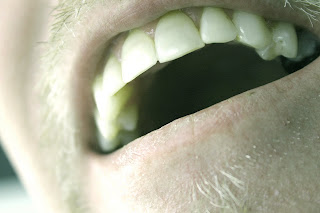When you know you have a bad breath, and it's keeping you from socializing or interacting with other people because you fear that your bad breath will blow people away; then get rid of these fears. You are not the only one suffering from it. It is a very common problem and can be caused by very minute problems like not cleaning your teeth properly, digestion problems, smoking, and more. In medical terms it is known as halitosis.
Causes of Bad Breath:Some of the main causes of bad breath are:
• It is caused by a particular type of bacteria which resides on the soft tissues in the mouth, mainly the back of the tongue. These bad breath bacteria reside under a blanket of mucous. Dead bacterial cells produce sulfur gases which causes the bad odor. Unfortunately, no mouthwash can clean these bacteria, no matter how frequently you use it, and toothbrushes are also of little help.
• Food debris which accumulates on the back of the tongue cause bad odor.
• Poor oral hygiene also leads to bad breath. If you do not wash your mouth properly after eating, the food particles in you mouth can rot and start to smell. They begin to collect bacteria which cause the bad odor.
• Our teeth attract bacteria containing plaque very easily, so if we do not brush our teeth regularly and thoroughly, large amounts of bacteria get accumulated, which results in bad breath.
• If you have periodontitis then you may often experience bad breath, as the bacteria get accumulated in areas that are not cleaned easily, such as deep pockets around teeth.
• Drinking alcohol and smoking.
• The decrease in saliva may also be the cause. When you are sleeping, the flow of saliva almost stops. Thus the reduced cleaning action of the saliva allows bacteria to grow, causing bad breath
• Bad breath is also seen in people who are dieting. The fact is that when you are not eating, the saliva decreases and bacteria growth increases; causing bad breath.
• Dehydration will lead to dryness of the mouth, and the reduced cleaning action of the saliva will allow bacteria to grow, causing bad breath.
• Other infections in our body, especially in the sinuses, lungs, or throat can also cause bad breath.
• Diabetes mellitus, kidney failure and malfunction of the liver.
• Metabolism disorder is another factor causing the odor.
• Gum infection which may cause a metallic breath odor.
• You may also experience bad breath when fasting, as your body is not provided with fuel in the form of food, and so fat and protein will begin to break down resulting in bad odor.
Treatments:It is advisable to go to your dentist for your treatment. The various treatments involve:

• A complete oral examination and health history. The dentist may ask you to have an "odor-meter" test done. This test can accurately measure the volatile sulfur gases and the extent of a halitosis problem.
• Periodontal disease and cavities would be treated.
• If there is an impacted tooth it would need to be removed, and other oral infections would be treated.
• Good oral hygiene is a must. Mouth washes and toothpastes are effective in managing oral odor. You must ask your dentist for a product that may be helpful to you.
These are some oral hygiene tips that you must follow to get rid of bad breath:
• Use floss at least once a day
• Watch your diet. Eat plenty of fruits and vegetables.
• Avoid alcohol and smoking.
• Do not skip meals as decrease in saliva will cause bad breath.
• Always clean your orthodontic appliances at least once each day. Pieces of food and germs can collect on these appliances and cause bad breath.
• Have regular dental checkups.
If you are not sure if you have bad breath, the best thing is to ask your friends for their honest opinion. Follow these routines and you will be free from bad breath!












